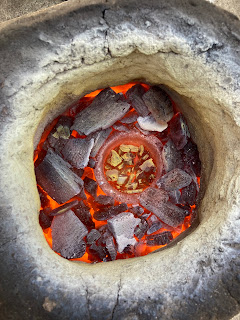Making Colophony (Pine Resin)

There's a cemetery near my house where I regularly walk my dog, and in it there's a Norway spruce tree that produces a lot of resin. Over time, I've collected it, thinking that it could serve when we make casting wax. Here's a nice, clear piece: Our recipe for casting wax is 70% beeswax, 20% paraffin, and 10% resin. In the past we've used store-bought gum arabic or damar but this time, we decided to use this cemetery pine resin. (We tried using a resinous substance from a Kentucky Coffee Tree once, but it didn't work.) First, we needed to get the resin ready, cleaned up as much as possible, purified of bits of bark, insects, and the like. I heated it up with a double boiler, assuming it was safest to use gentle, indirect heat on it. It didn't take too long before it started to melt. There were some chunks, though, that took much longer to dissolve than others, even when I put the pot directly on the heat. In the end, even when everything was boiling away...

